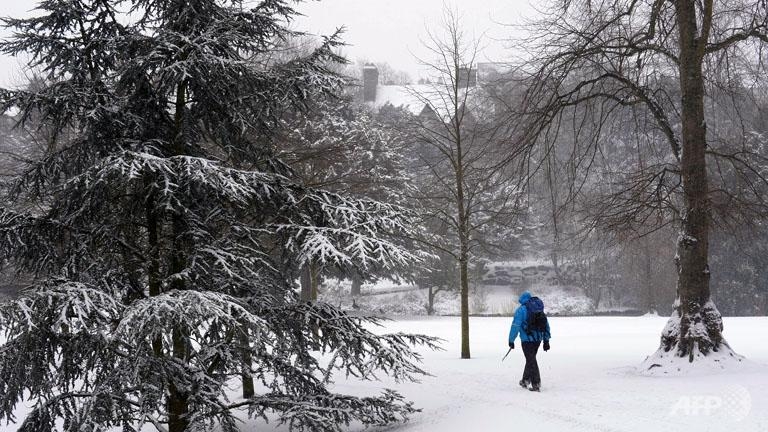British bad weather kills one, closes nuclear site

Thousands of homes lost power during the latest spell of bad spring weather in a month that the British media have dubbed "Miserable March".
Up to 40 centimetres (16 inches) of snow was expected in the worst-hit areas and reports - denied by the government - said gas stocks were just days from running out.
The snow also forced the closure of airports in Northern Ireland's capital Belfast and the city of Leeds in northern England.
In the scenic southwestern county of Cornwall, torrential rain triggered a landslide that smashed through an apartment block in the town of Looe.
Emergency services later found a body believed to be of a woman in her 60s who was unaccounted for. Around a dozen other residents of the building were evacuated.
The Sellafield nuclear site on the northwest English coast was forced to close for several hours as a precaution due to the weather.
Staff were sent home from the reprocessing and waste storage facility but there was no evidence of any safety issues, its operator said.
The plant, which deals with spent nuclear fuel from Britain and other countries, later reopened.
Sellafield was home to the world's first commercial nuclear power station, but it stopped generating electricity in 2003.
Leeds Bradford International Airport in northern England suspended all flights because of the snow.
Across the Irish Sea, Northern Ireland bore the brunt of the snowfall, caused by cold westerly winds from Russia and northern Europe colliding with an area of low pressure moving eastwards off the Atlantic Ocean.
Around 48,000 customers were left without power on Friday, said supplier Northern Ireland Electricity, which reconnected around 71,000 properties on Thursday night following "storm force winds and blizzard conditions".
"Damage has been caused by flying debris and high winds, including broken electricity lines and damage to poles," it said.
The snow forced the closure of Belfast City Airport, though the larger Belfast International remains open.
Northern Ireland's 2014 football World Cup qualifier with Russia was postponed until Saturday due to the snowy pitch at Belfast's Windsor Park.
Food supplies were being airlifted to the Isle of Man, in the Irish Sea, as the severe weather disrupted scheduled ferry services.
More than 1,000 schools around Britain were shut.
The Met Office national weather service said that while it was not unusual to see snow in March, the cold spell has been unusually long.
Temperatures were as low as minus 1.9 degrees Celsius (28.5 degrees Fahrenheit) in Dalwhinnie, central Scotland.
"We have had reports of around 15 centimetres of snow in Northern Ireland so far and similar levels over the Pennines (the hill range stretching downwards through northern England) and into Wales," said forecaster Helen Chivers of the Met Office national weather agency.
"By the time it stops we're expecting to see up to 40 centimetres of snow in places," she told AFP.
"It's blowing around in the strong winds so there will be deeper drifts."
Consultancy JBC Energy said British gas storage levels had shrunk to just 10 percent of total capacity, according to data from operators' association Gas Storage Europe.
"UK natural gas prices have spiked to record levels this month as the country grapples with an emerging supply crisis," it added.
But the government played down press fears that Britain's gas stocks would soon run out.
An energy ministry spokeswoman insisted: "Protracted cold weather increases demand but the UK gas market is responsive and our gas needs are continuing to be met."
Weather conditions were forecast to improve over the weekend.
What the stars mean:
★ Poor ★ ★ Promising ★★★ Good ★★★★ Very good ★★★★★ Exceptional
Related Contents
Latest News
More News
- Russian President congratulates Vietnamese Party leader during phone talks (January 25, 2026 | 09:58)
- Worldwide congratulations underscore confidence in Vietnam’s 14th Party Congress (January 23, 2026 | 09:02)
- Political parties, organisations, int’l friends send congratulations to 14th National Party Congress (January 22, 2026 | 09:33)
- 14th National Party Congress: Japanese media highlight Vietnam’s growth targets (January 21, 2026 | 09:46)
- 14th National Party Congress: Driving force for Vietnam to continue renewal, innovation, breakthroughs (January 21, 2026 | 09:42)
- Vietnam remains spiritual support for progressive forces: Colombian party leader (January 21, 2026 | 08:00)
- Int'l media provides large coverage of 14th National Party Congress's first working day (January 20, 2026 | 09:09)
- Vietnamese firms win top honours at ASEAN Digital Awards (January 16, 2026 | 16:45)
- ASEAN Digital Ministers' Meeting opens in Hanoi (January 15, 2026 | 15:33)
- ASEAN economies move up the global chip value chain (December 09, 2025 | 13:32)

 Tag:
Tag:




















 Mobile Version
Mobile Version